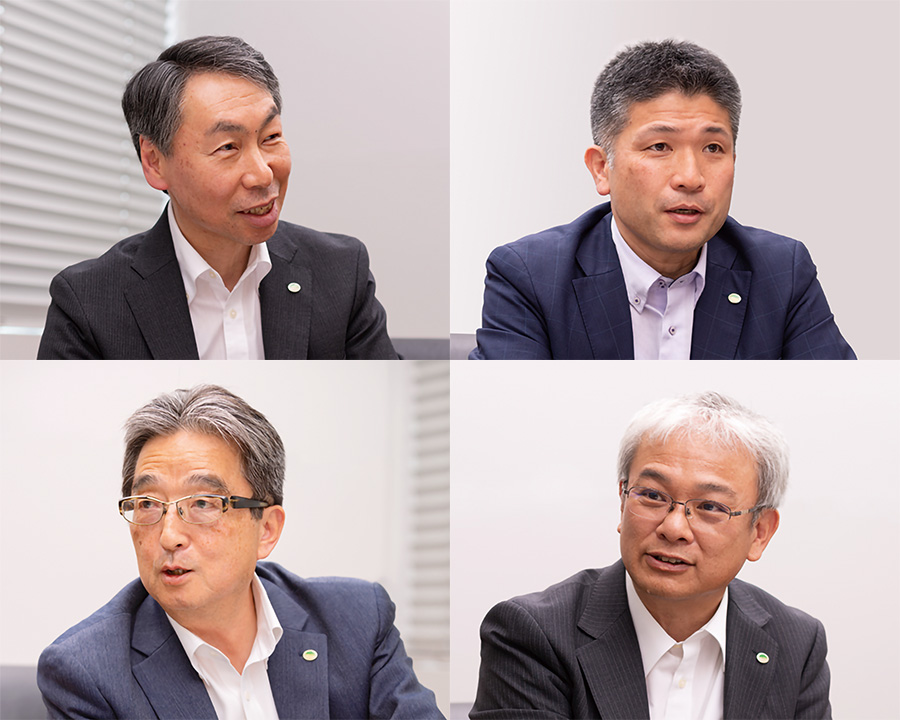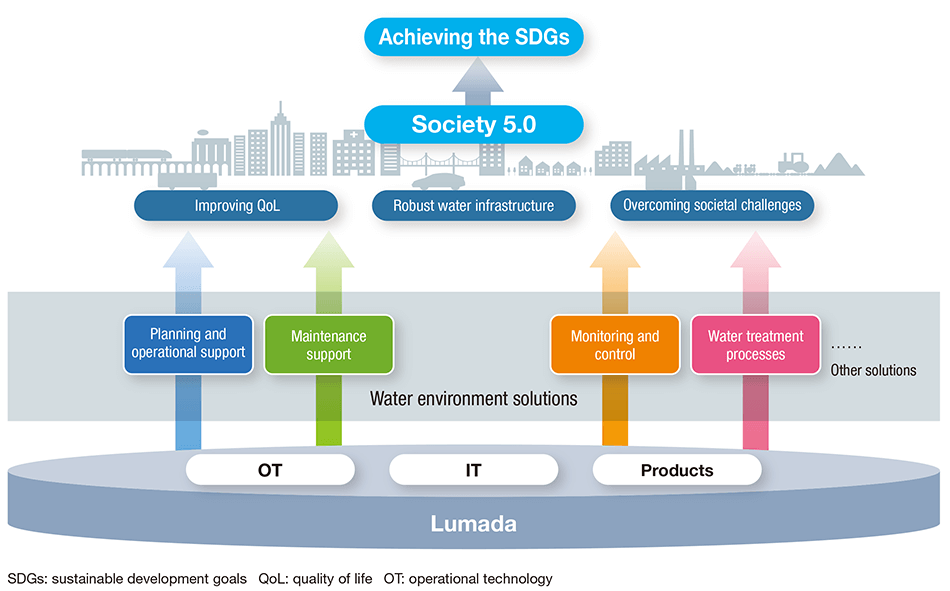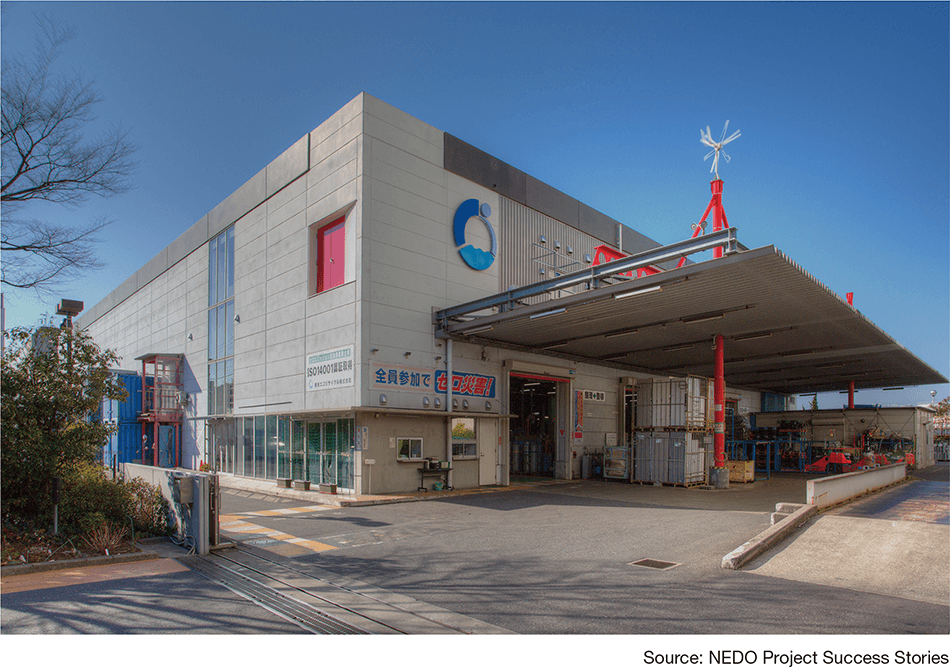Objectives of Environmental Innovation 2050
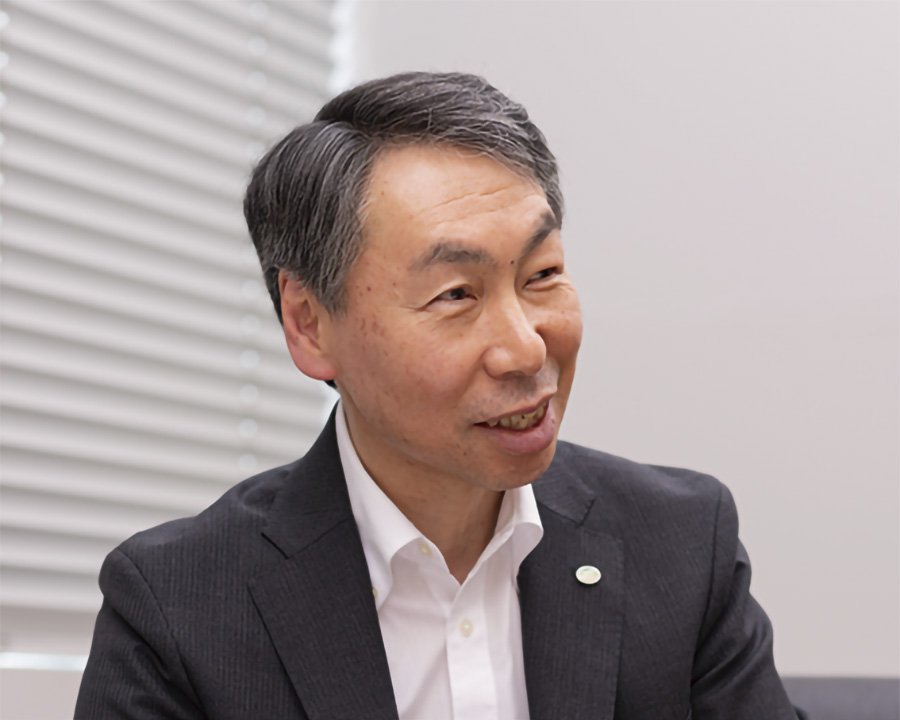
Kazunori Takahashi
Deputy General Manager, Sustainability Promotion Division,Hitachi, Ltd.
Harada: With the greater attention being paid to the Sustainable Development Goals (SDGs) set by the United Nations, how companies deal with sustainability is becoming one of the factors that determines the success of their global operations. The recent interest in non-financial forms of value, including social and environmental value, that is apparent in things like “environmental, social, governance” (ESG) investment is also transforming the way in which companies address environmental problems from threats into opportunities. Could you please explain what Hitachi Group is doing in response to these trends, starting with corporate functions?
Takahashi: Sustainability has been recognized as an issue for a long time, going back to the “Limits of Growth,” a 1972 report published by the Club of Rome. In terms of environmental issues, people have been talking for some time about not just global warming, but also the potential for shortages of water and other resources, the topics of today’s discussion. Accordingly, it is notable that the areas where we are starting to see an increase in the pace of practical action include climate change, access to safe water supplies, responsible manufacturing, and recycling. All of these are treated in the SDGs as a challenge for the entire world.
One of the factors behind the growth in ESG investment is a reaction against short-termism, which was also among the causes of the global financial crisis. Improving the sustainability of economic activity will be important for achieving a sustainable society, and there is growing recognition that doing so will require companies to adopt a long-term perspective while taking active steps to fulfill their societal obligations through their business activities.
It was against this background that Hitachi in 2016 published its Environmental Vision for combining a sustainable society with an improved quality of life, expressing the stance we want to take on environmental business practices. We also formulated our Environmental Innovation 2050 long-term environmental targets that seek to achieve a low-carbon society, resource efficient society, and a harmonized society with nature. These targets included an 80% reduction in CO2 emissions through the company’s value chain by FY2050 compared with FY2010, a 50% improvement in the efficiency of the use of water and other resources by FY2050 compared with FY2010, and the minimization of our impact on natural capital. A feature of Hitachi’s approach is that, at a time when attention is being focused on climate change, the effects of which are becoming apparent in the form of global warming, it also places an emphasis on recycling and on coexistence with nature. Dealing with resource depletion and protecting biodiversity and ecosystems are issues that cannot be underestimated in the context of sustainability. The aim is to boost both business and societal sustainability by managing in a way that considers the environment from a broad perspective.
Critical Role of Water Infrastructure and Recycling in Society
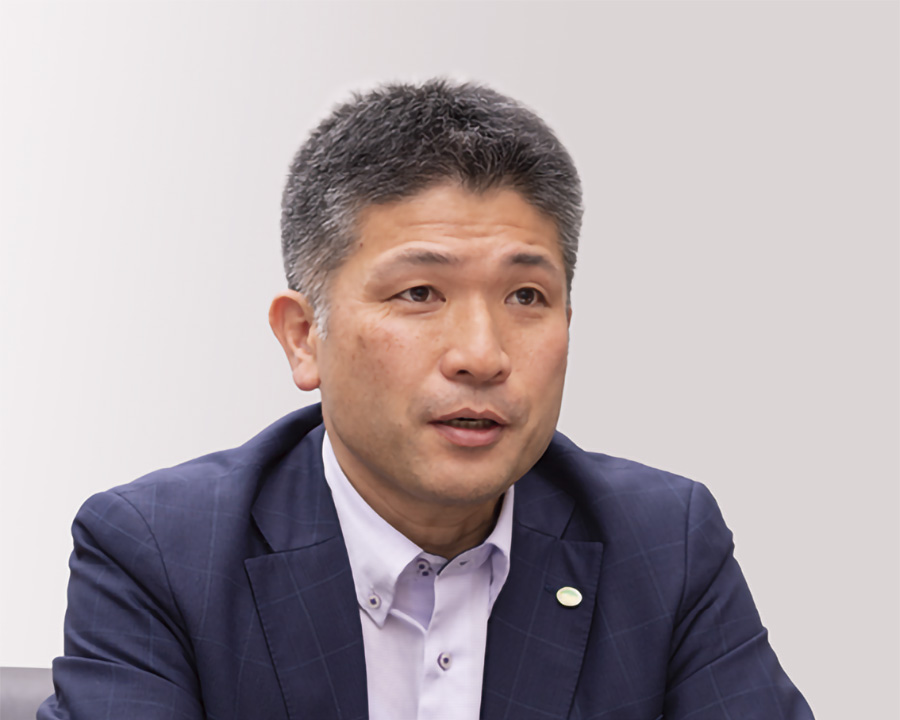
Makoto Onishi
Chief Technology Officer, Water & Environment Business Unit,Hitachi, Ltd.
Harada: Water environment and recycling are both important to sustainability. What are the business divisions doing in this area?
Onishi: Hitachi has long been involved in the water infrastructure business based around its electrical and mechanical equipment for water and sewage treatment plants and its operational technology (OT) for the monitoring, control, and operation needed for the efficient management of water. In recent years, Hitachi has also combined these with IT to supply total solutions to the water business around the world. Hitachi’s Water Business Unit was renamed the Water & Environment Business Unit in April 2019 to focus its efforts even more than before on supplying solutions to the water business based on an awareness of their impact on the environment and society.
Water is a vital part of the social infrastructure sustaining life itself as well as our way of life, such that its safety, security, and reliability of supply strengthen the infrastructural foundations of society. The focus of the water infrastructure business is not only to supply equipment that performs well in terms of things like energy efficiency, but also to provide societal value through the water business. In terms of the SDGs, we are operating our business in a way that contributes to overcoming the challenges not only of Goal 6 (clean water and sanitation), but also Goal 9 (industry, innovation and infrastructure), Goal 11 (sustainable cities and communities), and Goal 4 (quality education).
Overseas, for example, there are still many places where a lot of effort is required just to obtain water due to water shortages or a lack of water infrastructure. Our supplying such regions with technology for producing water and so on not only provides convenient access to water, it also delivers value in a way that can lead to regional development and improvements in living standards. Examples include encouraging new production by enabling the effort that previously went into obtaining water to instead be directed toward more productive activities, or providing opportunities for education by freeing children from the task of fetching water. In this way, we operate our business with a view to contributing not only to our customers, but also to society as a whole.
Kawakami: Hitachi seriously undertakes its societal responsibilities as a manufacturer and we have been recycling industrial products and other materials of our own initiative since the early 1990s. The practices and technologies associated with this contributed to the enforcement of the Act on Recycling of Specified Kinds of Home Appliances in 2001. Tokyo Eco Recycle Co., Ltd. engages in the recycling of four types of home appliances (air conditioners, cathode ray and flat-screen televisions, refrigerators and freezers, and washing and drying machines), personal computers (PCs), liquid crystal display (LCD) monitors, and other such devices in line with this Home Appliance Recycling Law and also on the supplementary articles regarding PCs; the Law for Promotion of Effective Utilization of Resources revised in 2003. We also conduct a recycling business for industrial equipment centering around Hitachi Group products.
The business relates directly to the recycling policies of the Ministry of Economy, Trade and Industry (METI) and has a close connection with Goal 12 of the SDGs (responsible consumption and production). Responsible production means that producers don’t just supply products to consumers, they also assume some positive responsibility for the impacts that their products have on the environment across their entire life cycle, from the choice of raw materials to manufacturing, use, and disposal.
Japan has a well-established system, enforced by law, for the recycling of home appliances under which consumers bear the recycling cost, retailers play the role of collection, and manufacturers handle the actual recycling. This system has been functioning successfully for nearly 20 years. The 49 home appliance recycling plants throughout Japan processed a cumulative total of around 230 million large home appliances between FY2001 and FY2018.
Hitachi has three recycling companies that are part of this system, comprising ourselves (Tokyo Eco Recycle), Hokkaido Eco Recycle Systems Co., Ltd., and Kantou Eco Recycle Co., Ltd. The three of us recycled approximately 1.4 million large home appliances during FY2018. The metals recovered are recycled by steelmaking or metal smelting companies while plastics and rare metals are recycled within Hitachi Group. We also work with other group companies such as Hitachi Metals, Ltd. to recycle neodymium magnets and raw materials, with some of our output being used in medical equipment supplied by the Healthcare Business Unit.
Hitachi Industrial Equipment Nakajo Engineering, Co., Ltd and we have engaged in the resource circulation of base metals and rare earths extracted from information and telecommunications electronics within Hitachi Group. The activity resulted in our winning the Minister of Economy, Trade and Industry (METI) Minister’s Prize at the Reduce, Reuse, and Recycle (3Rs) Awards run by the 3Rs Promotion Council.
Use of Digital Technology to Enhance Solutions and Services
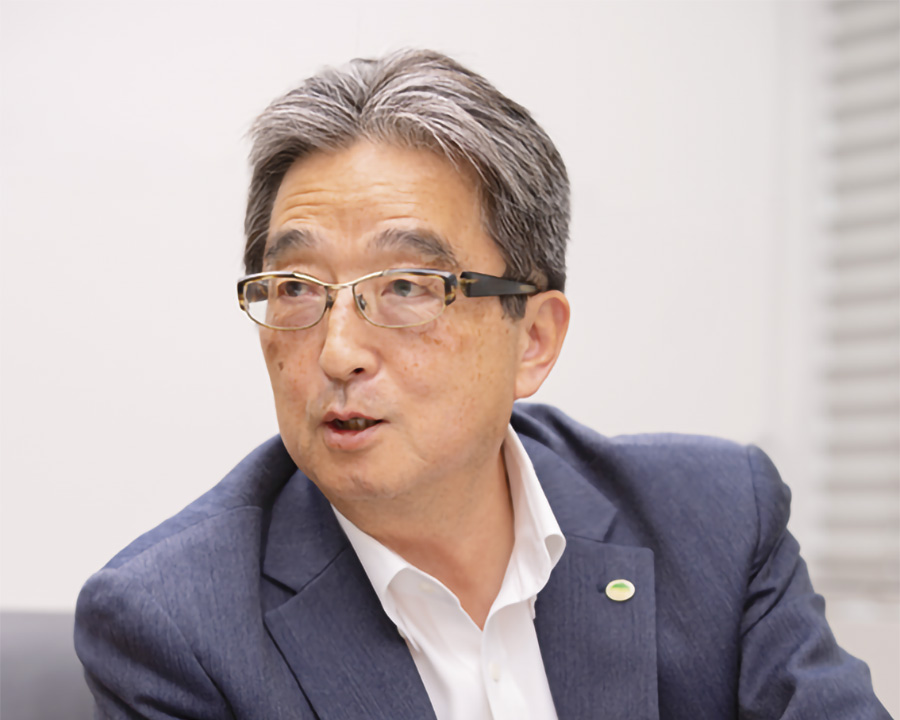
Nobuhiko Kawakami
President, Tokyo Eco Recycle Co., Ltd.
Harada: Industry and society are undergoing changes driven by digital technologies such as artificial intelligence (AI), the Internet of Things (IoT), and robotics, with an acceleration of initiatives in which the public and private sectors come together to work toward a human-centric super-smart society that fuses cyberspace and physical space, and that is being promoted by the Japanese government as part of Society 5.0. Engaging with this ongoing digital transformation will be important to the achievement of greater sustainability, including in the fields of water environment and recycling.
Takahashi: Obtaining an accurate understanding of the current situation is an essential first step in finding the right ways to deal with environmental issues. Advances in the IoT and other digital technologies have huge potential for the detailed acquisition and analysis of data to achieve this situational assessment. Examples include the use of sensors to determine details of how water is being used on a factory production line so that improvements can be made or to use it for leak detection. Other potential uses for the technology include the development of resource traceability systems that extend as far as the recycling stage.
Onishi: To strengthen our digital solutions that link together the OT, IT, and products for water infrastructure that have been built up over time, we also launched a digital solution in 2018 that supports operation and maintenance in the water business in the form of a cloud service for running water and sewage treatment utilities. The service uses the IoT to collect data in the cloud on things like equipment, operating conditions, work records, and fault and repair histories. This data is then used to support efficiency improvement and workload reduction in operation and maintenance, improve transparency, and help with skills transfer using techniques such as AI analysis and augmented reality (AR). Our intention is to offer this new technology and service to a wider base of customers after demonstrating its benefits by installing it at sites where we are already involved in operations.
We have also built a digital platform for the efficient maintenance of underground infrastructure, and have developed a system for the precise and rapid identification of leaks in water pipes that will be the first service to use the platform. The system combines newly developed vibration sensors that are able to collect data with high sensitivity and low power consumption with data analysis techniques that draw on the knowledge and expertise in leak detection that Hitachi has built up over time. Demonstration projects are currently in progress with the aim of launching the service in FY2020.
Kawakami: Recycling sites are heavily dependent on the skills and know-how of individuals, having yet to go very far with the use of digital technology. Given the looming prospect of labor shortages due to the rapid aging of experienced staff, a serious effort to introduce digitalization and mechanization into recycling sites and recycling businesses will be essential. In our own operations, we hope to employ automatic disassembly robots, use the IoT to expedite monitoring processes, and improve visualization to manage maintenance and enhance the efficiency of electric power generation.
Sustainability throughout the Entire Value Chain
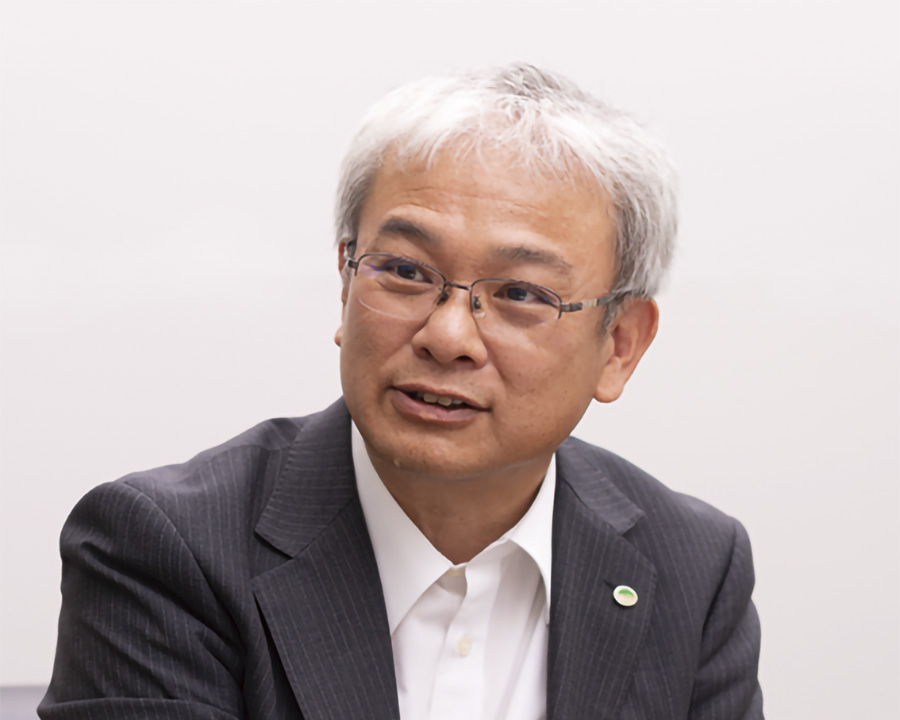
Yasushi Harada
General Manager, Center for Technology Innovation - Energy, Research & Development Group, Hitachi, Ltd.
Harada: I expect that achieving sustainability will require working with a wide variety of different sectors within society, with open innovation and collaborative creation with customers becoming increasingly important, would you agree?
Takahashi: As you say, environmental issues are not something that we can tackle on our own and it is vital to think in terms of the entire value chain. If we are to take our place as part of the great loop that is the recycling-based society, the challenge for Hitachi in the future will be to think collectively about not just our own activities, but also the use of water and other resources by suppliers and customers, and to offer ways of reducing or recycling and then to work together to put them into practice.
Onishi: A recent example of collaborative creation is a joint research project with the Osaka City Waterworks Bureau launched in March 2019 that aims to develop a technique for the medium- to long-term prediction of water demand using the Lumada IoT platform, AI, and big data analytics, and to use this as the basis for optimal operation of the water system. Water infrastructure has always been something we build in partnership with the customer, with numerous instances of open innovation like that found in national projects. Recent times have also seen growing use of an approach whereby participants from other business domains get involved and the different parties bring their own respective expertise to bear to complete the overall system. Our intention is to build better systems and solutions by engaging in collaborative creation with customers and working together in an open nexus that transcends particular business domains.
Kawakami: The appliance recycling business doesn’t handle only Hitachi products. The major manufacturers were divided into two groups, each of which has set up an administration company to deal with recycling. Knowledge and expertise are necessary for us to handle products from other vendors and disassemble different models of appliance made from different materials. Accordingly, the administration companies manage the recycling technologies and product information, sharing this information with the group companies as well as the technologies and systems developed by the various recycling plants. The idea is to be used for open innovation to raise standards across the group.
Facing up to Shared Global Challenges
Harada: The recycling of water and other resources can in itself be described as a global challenge. What about your engagement with global society and regional issues?
Takahashi: Sustainability and the SDGs are themselves global issues and the work done to address them can be thought of as a global activity. The problem of plastic in the oceans has become a topical one in recent times and the Japanese government has formulated and begun implementing a strategy for plastic resource recycling. This in turn has led the Japan Business Federation (Keidanren) to get started on setting reduction targets for industries such as the electrical and electronics industries, and Hitachi intends to play its part in this work.
Onishi: The water environment business is becoming global at an increasingly rapid pace with the aim of alleviating water shortages around the world. The business deals with the different needs and regulatory frameworks found in different countries or regions while supplying water treatment technology for things such as seawater desalination and wastewater reclamation, as well as advanced wastewater treatment technologies that remove nitrogen.
Responding to international standardization is an important issue in global business. This involves companies working with public agencies rather than acting alone, and Hitachi is participating actively in the standards setting process with the hope that this will help create a global marketplace that Japanese companies will find easy to access.
Kawakami: Capitalizing on the signing of a licensing agreement for home appliance recycling technology between Hitachi and the National Development and Reform Commission of the People’s Republic of China following the passing in 2009 of China’s home appliance recycling law (Regulations for the Administration of the Recovery and Disposal of Waste Electrical and Electronic Products), Hitachi played a central role in five projects up to 2013 that involved the sale of technology. This exemplifies a shift away from the export of tangible goods such as plants toward the supply of intangibles such as services and technology consulting, and our intention for the future is to accelerate the global deployment of service businesses on recycling.
Tokyo Eco Recycle has provided factory tours with visitors from more than 50 countries, including officials visiting Japan for a G7 Environment Ministers’ Meeting. We have demonstrated our various activities to them. This presentation of Japan’s advanced technologies and schemes might be one of our global activities.
Creating Social and Environmental Value through Social Innovation Business
Harada: In May 2019, Hitachi released its 2021 Mid-term Management Plan that lays out its vision of becoming a global leader through the operation of its Social Innovation Business and addresses the SDGs and regional environmental problems. Please tell me about your enthusiasm for this new challenge.
Takahashi: The 2021 Mid-term Management Plan clearly expresses our aim of enhancing social, environmental, and economic value. While our policy of contributing to society through our Social Innovation Business has been stated in the past, this new plan makes this more explicit with the inclusion of numerical targets. In the water industry, for example, we have a target of providing safe and trusted water infrastructure to 70 million people daily around the world in the form of water and sewage services and desalination technology. To achieve this, we hope to see greater recognition than ever of how our business builds social and environmental value into what we offer to our customers. We intend to boost further the effort we put into supporting this.
Onishi: The water environment business already includes public-private partnerships for infrastructure operation in forms that include private finance initiatives (PFIs) and full-service outsourcing. It is anticipated that the water business will start making increased use of concessions following the 2018 revisions to Japan’s Water Supply Act. Public-private partnerships set to become ever more important in the future given the urgent need to deal with aging infrastructure as well as the concerns, prompted by a declining population, of a staff shortage in operating and managing water and sewage services. Hitachi has built up a relationship of trust with customers through its operations business, having put in place the capabilities needed to respond promptly to equipment problems. We are also drawing on the knowledge and expertise we have built up over time to work alongside customers on resolving challenges, and are seeking to incorporate the latest digital technologies to offer more extensive and sophisticated operational services. By doing so, we intend to continue maintaining the safety and security of water while also contributing to social innovation.
Kawakami: Along with the acceleration of work on Society 5.0, what is needed is to make the transition away from the era of high resource consumption and toward one in which recycling allows people to coexist sustainably with nature. To contribute to the realization of a sophisticated recycling-based society as shown in Hitachi Environmental Innovation 2050, working with the Hitachi Group companies, Tokyo Eco Recycle aims to develop the technologies needed for recycling to be adopted more widely as a business model, including technologies for advanced disassembly, sorting, refurbishment, remanufacturing, and sensing. We are willing to develop technologies which enable us to enjoy safer and more stable operation of our own recycling equipment. Employing the latest technologies we intend to be a leading company in the recycling sector. We also commit ourselves to continuous contribution to the creation of a sustainable society through recycling.
Harada: Today’s discussion has reinforced my sense that sustainability is a core challenge shared by all sectors of society and also the importance of what the entire Hitachi Group is doing in this area. Let’s work toward becoming a global leader of a sustainable society by extending these efforts throughout the entire value chain.

